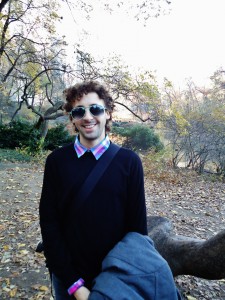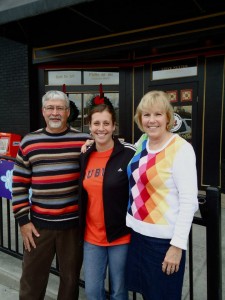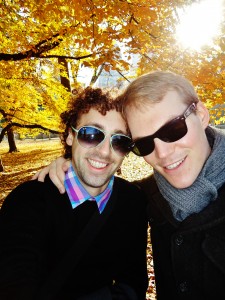Okay.
I’ll just go ahead and throw out a few caveats beforehand.
One, it’s 2:40 AM on a Monday that’s promising freezing rain during my hour-and-a-half work commute. Two, I haven’t had a decent night’s sleep in days. Three, my normal weekday alarm will be going off in less than an hour.
So, kittens, there you have it. Because you know what’s coming. A bitch sprinkle-topped sundae to start your Monday off right.
***
Now, in my quest to reclaim some much needed sleep, I drink water, pee, check to see if there’s the slightest chance that work will be cancelled and I can take an anti-anxiety pill to calm my nerves and smack me into a deep sleep.
Alas, now I have to pee more, and get to look forward to a fun-filled drive to work at 4 AM.
But just for shits and giggles, I figure I may as well catch up on the world and read something.
So, as I scroll through the emotion-filled Facebook posts about Downtown Abbey, I happen upon this article about gay men and body image, specifically how seemingly pervasive body dysmorphic disorder is among gay men.
I figure, “Great, this’ll be interesting.”
Instead, I’m angry and more than a smidge disappointed.
***
Like most subcultures nested within any identity group, gay men have plenty of stereotypes mapped onto them. Some are slightly accurate. Some are fun to re-appropriate and deploy among gay friends. Most are just plain annoying.
And this article played right into those stereotypes, with its first ab-clad image.
Sure, who hasn’t been discontent with their body?
Whether you’re straight or LGBT, it’s hard to find a single person who’s never had some form of body dysmorphic disorder–who’s looked into the mirror every single day of their life and said, “Oh hey, hot stuff. Lookin’ good as always! *Wink*”
But the two main justifications for why it seems that gay men are disproportionately affected are what floored me: (1) Childhood trauma, including parental rejection; (2) Heteronormative social morays.
Alakazam!
So, because my parents hated me, because the Catholic church preached that homosexuality is a sin in the eyes of an omnipotent God, because society’s default is heteronormative behavior, I’m doomed to do extra crunches for the rest of my life?
Um, no.
For one, my parents didn’t hate me; they just didn’t know part of me. Because, being gay isn’t who I am, it’s only one part. And now they’re unbelievably supportive.
Did they reify certain heteronormative behaviors and map them onto me as a kid? Sure. But what parents don’t screw up their kids in some way? Did that irrevocably damage me? No. Did it make my coming out process that much more difficult and seemingly stunt me sociosexually? A bit.
Secondly, whether it was juvenile angst, disinterest, or a combination of the two, I never really paid attention in church. Because, well, I thought all of those things being preached about were a bit restrictive. Not so unlike the polyester-blend pants I wore to CCD.
I mean, even when we glossed over the sinful topic of “self-love” in confirmation class, and I saw all the boys shift nervously and uncomfortably, I knew they each had their own little secrets that only they, their hands, and whomever washed their bed sheets knew.
Third, were gay porn stars and the gays-for-pay on Queer as Folk the closest figures to role models this oppressive heteronormative society left me? (And, yes, I know some of the QaF actors are LGBT.) No. Were they the ones I saw the most as a 21 year-old trying to reconcile all of this in my noggin? Sure.
And after I announced my gayness to my empty faux wood-paneled apartment in Tuscaloosa, Alabama, did I say to myself, “Okay, I’m gay. Now what?” And from there, did I revamp my diet, go to the gym every single day, and begin cycling into anorexia? Yes, yes, and yes. In the process, did I find that elusive six pack, Orlando Bloom’s chiseled jaw? No. But did I want that? I thought I did.
But after I destroyed my legs from improper weight-lifting, followed by excessive cardio; after I lost fifteen pounds and could fit into XS shirts, but still felt awful; after I told myself I was in control, but knew better after waking up in a series of beds, did I blame my parents, my former faith, American society?
Hell no. I blamed myself.
Because regardless of your background, only you can become comfortable with yourself. That’s the most basic truth anyone can ever fully realize about themselves.
Nothing’s going to happen magically, or through prayer, or because you saved that puppy from getting plowed over in the interstate. You’re not going to wake up and have a six pack, have defined biceps, have amazing quads if you don’t get off your ass and do something about it.
And you’re not going to find a counterpart if you align your mental cogs with a defeatist mentality that’s constantly whispering, “Nobody will love you and your love handles. Life’s so unfair for you.”
Maybe I’m just annoyed because I’m finally at a point in my life where I’m comfortable with myself. And sure, that took going through anorexia, bulimia, self-mutilation, and nearly entertaining suicidal thoughts.
But now I’m content enough with my body that I don’t have to run to the gym whenever I go on a carb bender. Nor do I shove my finger down my throat.
I exercise when I can, strengthening my mind and body as I go. Because when you’re finally at a point when you can look in the mirror and not cringe–when you’re not exactly where you want to be, but, hey, you’re fine with that–you begin to exude this sense of self worth that’s more potent than any pheromone. And people pick up on that.
More importantly, gay guys, the worthwhile gays recognize it. And those who don’t, or think you’re delusional, are too preoccupied with finding their Castro clone amidst a sea of rippling thighs and bulging biceps. But we’re not all Brian Kinney’s in search of a Justin; some of us are Ted’s, or Emmett’s, or Michael’s, or Justin’s, or Ben’s.
Or ourselves.

And there’re plenty of allies, faith groups, friends, and LGBTs who recognize that, too. My family, friends, and boyfriend all do.
Life’s not a flowerbed that’s suddenly glutted by roses. And there’s not always going to be firm grounding to root into. It takes weeding, tilling, cultivation, and maintenance.
And while you’ll get pricked by life’s thorns, and meet plenty of pricks in the process, those experiences and people won’t define who you are or who you want to be. Only you can do that.
***
Now, many of y’all (the three people who read this blog) are probably rolling your eyes or saying that I’m contradicting myself and reaffirming everything this article’s author has discussed.
I’ll be the first to admit that I’m not a saint. That I’ve entertained some pretty dangerous behavior. That I’ve been untrue to myself. That I’ve told myself who I want and what I’ll be and that nothing will change that.
But experience changes you. Every single one. And it’s up to you to learn from them, dovetail them with your personal history, and make something worthwhile out of it all. Not tell yourself you’re a gay victim in the straight world.
For me as a gay man, I started out writing my life’s memoir as a ghost writer–some other shade of the person I thought I’d be.
But for a while now, I’ve been happy to take that pen back and take credit where it’s due.




